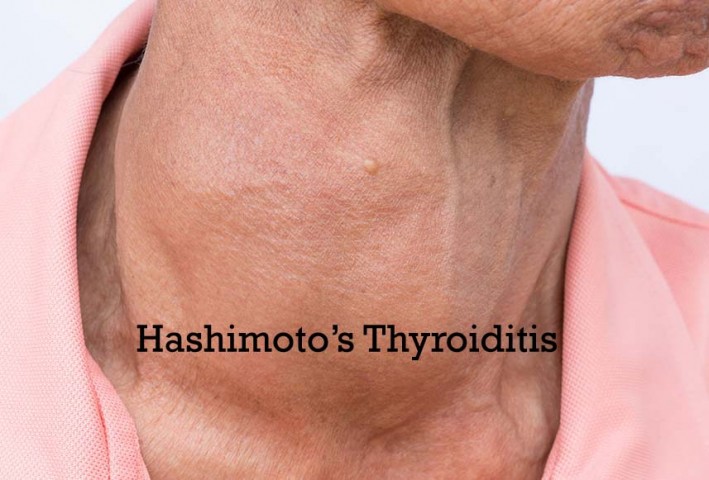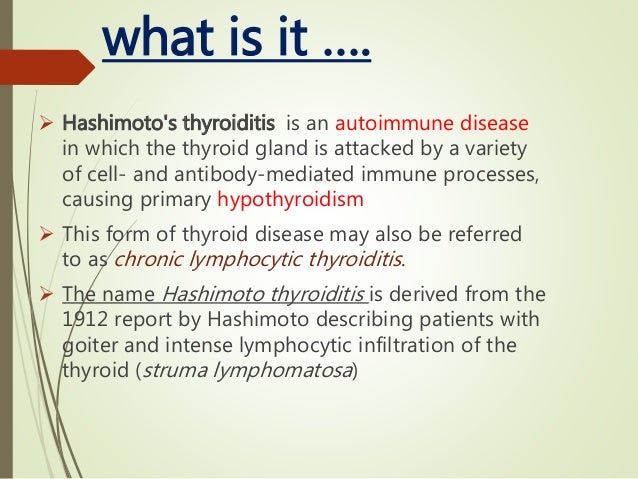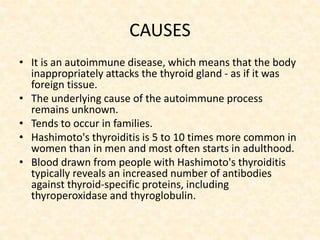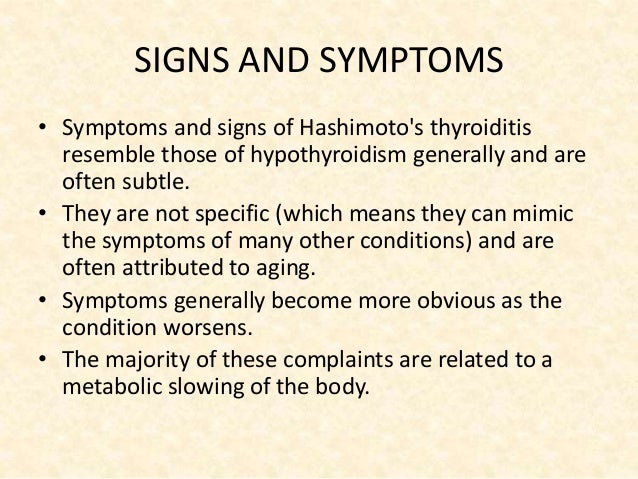108 Glen Osmond Road, Parkside

What is Hashimoto's Thyroiditis:
Hashimoto’s thyroiditis is the most common cause of hypothyroidism in developed countries. It is ten times more common in women than in men and is especially common in women who are between forty-five and fifty-five years old. Hashimoto’s is an autoimmune disorder, which essentially means that the body starts attacking its own cells instead of foreign “invader” cells. Hashimoto’s manifests when the immune system begins targeting the thyroid, causing chronic inflammation. Over time, these repeated attacks on the thyroid decrease its ability to produce hormones and can lead to an underactive thyroid.

Alternative Names:
Hashimoto thyroiditis; Chronic lymphocytic thyroiditis; Autoimmune thyroiditis; Chronic autoimmune thyroiditis; Lymphadenoid goiter - Hashimoto; Hypothyroidism - Hashimoto; Type 2 polyglandular autoimmune syndrome - Hashimoto; PGA II - Hashimoto
Causes of Hashimoto’s Thyroiditis:
Doctors aren't entirely sure why the immune system, which is supposed to defend the body from harmful viruses and bacteria, sometimes turns against the body's healthy tissues.
Some scientists think a virus or bacterium might trigger the response, while others believe a genetic flaw may be involved. A combination of factors — including heredity, sex and age — may determine your likelihood of developing the disorder.

Symptoms:
Symptoms of Hashimoto disease may include any of the following:
* Constipation
* Difficulty concentrating or thinking
* Dry skin
* Enlarged neck or presence of goiter, which may be the only early symptom
* Fatigue
* Hair loss
* Heavy or irregular periods
* Intolerance to cold
* Mild weight gain
* Small or shrunken thyroid gland (late in the disease)

Diagnosis of Hashimoto's Thyroiditis :
The diagnosis of Hashimoto’s thyroiditis may be made when patients present with symptoms of hypothyroidism, often accompanied by a goiter (an enlarged thyroid gland) on physical examination, and laboratory testing of hypothyroidism, which is an elevated thyroid stimulating hormone (TSH) with or without a low thyroid hormone (Free thyroxine [Free T4]) levels. TPO antibodies, when measured, are usually elevated.
Occasionally, the disease may be diagnosed early, especially in people with a strong family history of thyroid disease. TPO antibodies may be positive, but thyroid hormone levels may be normal or there may only be isolated mild elevation of serum TSH is seen. Symptoms of hypothyroidism may be absent.
Ayurvedic management of Hashimoto's Thyroiditis:

According to Ayurveda there are three biological elements present in our body: vata, pitta and kapha which should be in balance. In Hashimoto's thyroiditis, imbalance in kapha and impaired digestive fire (Agni) produce a blockage in all our channels and result in impaired functioning of thyroid gland.
Hashimoto’s thyroid disease is a disease of the immune system characterized by hypothyroidism and subsequently obesity and also diabetes. The disease can be managed by Ayurveda, and can be maintained in Ayurveda as it can be seen as a Yapya roga or controllable disease. Here the progress of the disease would be stalled or slowed down. Ayurvedic medicine can be used alongside standard treatments to help you manage your thyroid disorder as a complementary treatment option.
The Ayurvedic prakriti manifestation would be an increase in the pitta, kapha, or sometimes vata. This could be gleaned by identifying the symptom of your most recent fever that you got besides high temperature. The symptoms like pain is suggestive of vitiated vata, burning sensation or bitter taste in tongue is seen as the vitiation of pitta, or a sensation of heaviness as if body covered with wet cloth or fevers with chills can be seen as a vitiation of kapha.
Ayurvedic herbs and herbal formulations are used as written below to manage Hashimoto's Thyroiditis.

* Kanchanar, guggulu, Shilajit and Varuna : Hashimoto's thyroiditis leads to hypothyroidism causing body metabolism to slow down, leading to weight gain, puffy face and a drop in core body temperature also. So people with low levels of thyroid hormones may have a low tolerance of the cold, tiredness, weakness in muscle and fatigue, thinning of hair, irregular menstrual cycle in women. Kanchanar, guggulu, Shilajit and Varuna are helpful to maintain the normal metabolic rate, reduce weight and enhance the normal functioning of thyroid gland by removing the obstruction from the channel
* Varun, Punarnava and Gokshura : These herbs are helpful in restoring thyroid hormone balance and also helps to reduce swelling and puffiness.
* Ashwagandha : Ashwagandha helps in treating anxiety, depression and impaired memory symptoms because the brain requires thyroid hormones to function correctly, Low levels of thyroid hormones can cause changes in brain structure and functioning.
* Amla and Guduchi: These two help to improve immunity, overall strength and stamina of the body
* Brahmi and Gotu Kola: These are helpful in managing depression, impaired memory and its natural action on blood circulation helps to relieve constipation and skin dryness.
Read here for more detailed treatment options in Ayurveda for Thyroid Problems:- https://www.lifelineherbal.com.au/treatments/thyroid-problems-ayurvedic-herbal-treatment.html
You can contact our Ayurvedic practitioners to finalize your Ayurvedic Herbal treatment plan for Thyroid related issues HERE
Disclaimer : Sandeep Kumar and Anupam Vasudeva are not GP, they have Ayurveda medical degree from India where it is considered equal to any other medical degree. This qualification is recognized in Australia by vetassess governing body as Complementary Health Therapists. Life Line Ayurvedic Herbal Clinic does not claim to cure a disease or terminal illness and does not create any unreasonable expectation of beneficial treatment. Ayurvedic medicines and treatments are generally considered to be safe but rarely may be associated with possible adverse reactions in individual cases. We recommend seeking urgent medical attention in the case of an adverse reaction. This website provides you with information. You must contact your Ayurvedic or another health professional before you apply them. Read More